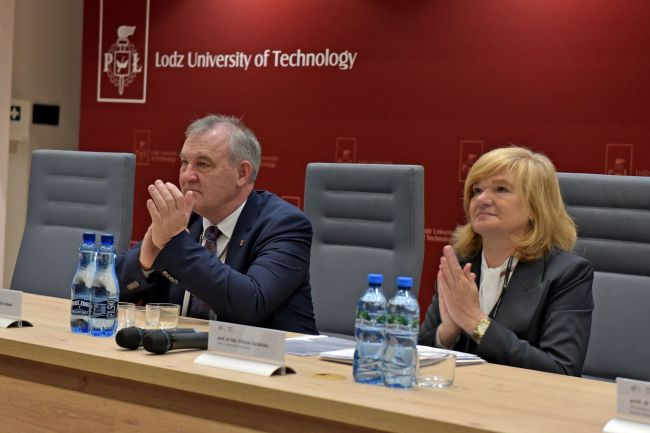
Divided into three sessions, the debates addressed topical issues for the academic community. With unanimous approval, the CRASP Plenary Assembly adopted a resolution in which the Rectors expressed their stance on the role of science and higher education in Poland and called for the formation of a strong and solid ministry to hold authority over science and higher education.
During the proceedings held in the Professor Tadeusz Paryjczak Auditorium, a number of issues were discussed, each introduced by a keynote speeches by the following speakers.
The first to take the floor was Wojciech Murdzek, Secretary of State at MEiN, addressing, among other things, the ministry's plans regarding funding for higher education.
Dr Anna Budzanowska, director of the Department of Innovation and Development at MEiN, spoke about the Polish presidency of the EU Council in the first half of 2025 and the need to identify the most pressing issues in education, research, development, and innovation.
Dr inż. Jarosław Protasiewicz and Marek Michajłowicz, directors of OPI PIB, presented the Institute's portfolio that includes more than 20 essential systems. They also shared information about the projects and services currently in the pipeline, including doctoral and student m-legitimation.
Prof. Celina M. Olszak, rector of the University of Economics in Katowice, discussed the results of the report 'Science, Higher Education, and GDP', prepared by five economic universities. She outlined some of the main findings of the study with respect to the funding of higher education, one of which was that 'each and every złoty spent on R&D yields a return of 8 to 13 złoty higher GDP'.
Prof. Alojzy Nowak, rector of the University of Warsaw, presented the concept of an endowment, which, following the example of American universities, could be one of the sources of funding for university activities.
Prof. Jerzy Lis, rector of AGH, who coordinates the activities of CRASP universities to aid Ukraine, discussed the scope of that effort. At the moment (as of October 18, based on the conducted surveys), over 24,000 students from Ukraine are enrolled in full-time courses in Poland, and more than 1,000 workers have been employed by universities. The total of costs incurred by universities and research institutes has exceeded 300 million złoty (based on the survey of June 25, 2023).
One topic that aroused an animated discussion was the evaluation.
Prof. Filip Szymanski, Chair of the Commission for the Evaluation of Research, commented on the practice of assigning scores for publications in certain journals stressing the need for a reform and revision of the existing system.
Prof. Elżbieta Żądzińska, rector of the University of Lodz, presented recommendations for modifying research evaluation derived from a diagnosis conducted since the last evaluation. According to the rectors, a number of the proposed amendments could still be introduced during the current evaluation period.
Also linked to the topic of journals was the presentation by Tomasz Psonka, director of Elsevier Publishing, who spoke about a transformational agreement that "transforms" traditional support for subscription publishing into support for open access. What it does for researchers is it allows them to read publications and publish them without having to bear any kind of transaction costs.
Next, prof. Stanisław Kistryn of Jagiellonian University, vice-chairman of the MSCG, outlined the CoARA initiative, which is an international agreement to develop good practice for assessing research.
Dr Andrzej Dembczyński, president of the Łukasiewicz Research Network, while presenting the capacity of the network, one of Europe's largest research networks, highlighted how important collaboration with universities is and outlined the mechanisms proposed to facilitate it.
Another topic of discussion, introduced by Agata Zarzycka from the CRASP Monitoring Committee and Anna Marciniak expert from the NCBR, concerned programs of the European Social Fund 2021-2027.
One issue of global relevance, detailed in the 2030 Agenda which includes the 17 Sustainable Development Goals, was taken up by the rector of the Warsaw School of Economics, prof. Piotr Wachowiak. Prof. Wachowiak elaborated on the Diversity Charter, an international action run within the 17 Goals Campaign, which seeks to promote diversity and equal opportunity in employment. In Poland, the movement is coordinated by the Responsible Business Forum.
The last session, called 'the host has the floor', featured the rector of the Lodz University of Technology, prof. Krzysztof Jóźwik, who gave a presentation on the highly topical subject of micro-credentials. Its relevance stems from the rate of the advancement of knowledge, the need to keep our knowledge up to date, the need and urge for lifelong learning, and the presence of Polish universities in the European university networks. Prof. Łukasz Bogucki, Vice-Rector for International Relations at the University of Lodz, also contributed on this subject, which sparked an interesting and lively discussion.
Apart from the debates, the two-day CRASP Plenary Assembly featured a presentation of awards and distinctions: The Elsevier Research Impact Leaders Award, conferred on universities for their contribution to raising the profile of Polish science, was presented at the Grażyna and Kiejstut Bacewicz Academy of Music in Łódź, whereas the Education Excellence Certificates, awarded to more than a dozen fields of study by the Polish Accreditation Committee, were presented at Lodz University of Technology.
